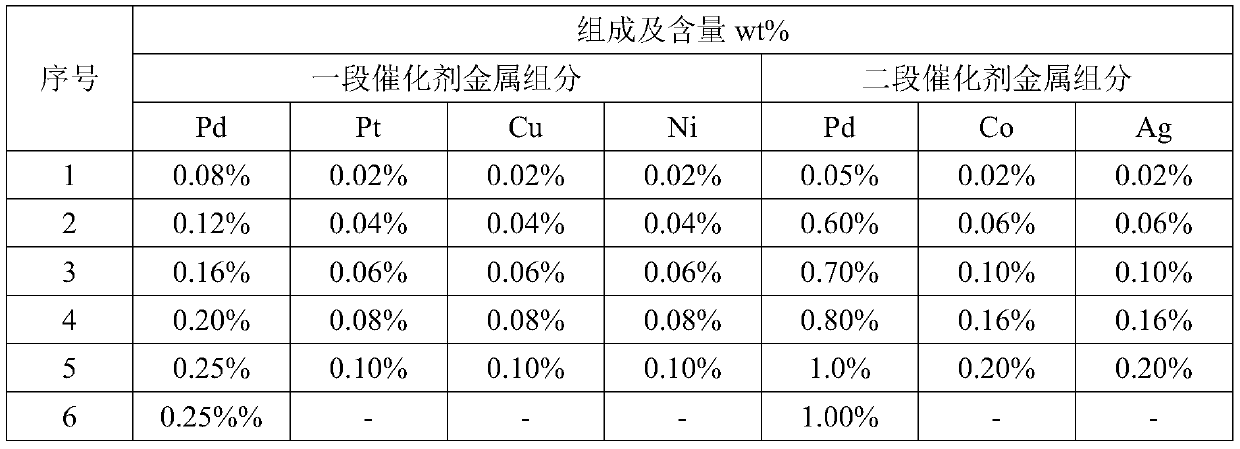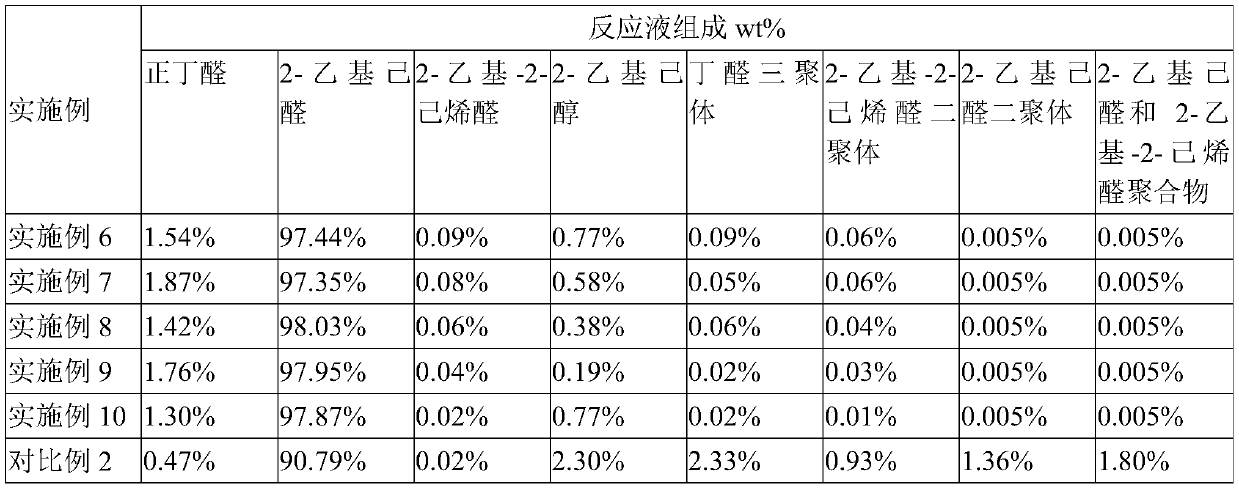Method for preparing 2-ethylhexanal
A technology of ethylhexanal and ethyl, which is applied in the field of preparation of 2-ethylhexanal, can solve the problems of low catalyst processing capacity, high energy consumption in the separation process, and high three wastes in heavy components, and achieve considerable economic benefits and high yields. The effect of high efficiency and simple production process
- Summary
- Abstract
- Description
- Claims
- Application Information
AI Technical Summary
Problems solved by technology
Method used
Image
Examples
Embodiment 1
[0054] One stage catalyst preparation:
[0055] Add 65.6L of deionized water to the reactor, and then add 998.6g of nano-alumina with a particle size of 20-50nm to prepare a nano-oxide dispersion, the temperature of the dispersion is 75°C;
[0056] Weigh 1.73g Pd(NO 3 ) 2 , 0.33gPt(NO 3 ) 2 , 0.59gCu(NO 3 ) 2 , 0.62gNi(NO 3 ) 2 , Adding 323.95g of water, adding the resulting mixed salt solution and alkaline precipitant sodium carbonate to the nano-oxide dispersion at the same time for reaction, the reaction temperature is 80°C, the dropping time is 2h, and the pH of the reaction system during the reaction is controlled to 6. After the dripping is completed, an alkaline precipitation agent is added to adjust the pH to 8, and then aging, the aging temperature is 90°C, and the aging time is 1.5h to obtain a slurry;
[0057] The slurry was filtered, washed, dried at 100°C for 18 hours to obtain a filter cake; then, roasted at 1000°C for 8 hours, crushed, and pressed into pieces, reduced ...
Embodiment 2
[0064] One stage catalyst preparation:
[0065] Add 98.8L of deionized water to the reaction kettle, and then add 997.6g of nanometer titanium oxide with a particle size of 20-50nm to prepare a nanometer oxide dispersion, and the temperature of the dispersion is 75°C;
[0066] Weigh 2.60g Pd(NO 3 ) 2 , 0.65gPt(NO 3 ) 2 , 1.18gCu(NO 3 ) 2 , 1.25gNi(NO 3 ) 2 , Add 372.8g of water, add the resulting mixed salt solution and alkaline precipitant potassium bicarbonate into the nano-oxide dispersion at the same time for reaction, the reaction temperature is 85°C, the dropping time is 2.5h, and the pH of the reaction system during the reaction is controlled as 5. After the dripping is completed, add alkaline precipitant to adjust the pH to 7.5, then age, the aging temperature is 85°C, the aging time is 1h, and the slurry is obtained;
[0067] The slurry was filtered, washed, and dried at 100°C for 12h to obtain a filter cake; then, it was calcined at 800°C for 10h, crushed and pressed into p...
Embodiment 3
[0074] One stage catalyst preparation:
[0075] Add 198.3L of deionized water to the reactor, and then add 996.6g of nano-zirconia with a particle size of 20-50nm to prepare a nano-oxide dispersion, the temperature of the dispersion is 75°C;
[0076] Weigh 3.46g Pd(NO 3 ) 2 , 0.98gPt(NO 3 ) 2 , 1.77gCu(NO 3 ) 2 , 1.87gNi(NO 3 ) 2 , Add 1608.80g of water, add the resulting mixed salt solution and alkaline precipitant ammonium bicarbonate into the nano-oxide dispersion at the same time to react, the reaction temperature is 85℃, the dropping time is 2.5h, and the pH of the reaction system is controlled during the reaction 7. After the dripping is completed, add alkaline precipitant to adjust the pH to 8.5, then age, the aging temperature is 90℃, and the aging time is 2h to obtain the slurry;
[0077] The slurry was filtered, washed, and dried at 100°C for 24 hours to obtain a filter cake; then, it was calcined at 1200°C for 5 hours, crushed, and pressed into pieces, reduced at 150°C and...
PUM
| Property | Measurement | Unit |
|---|---|---|
| particle diameter | aaaaa | aaaaa |
Abstract
Description
Claims
Application Information
 Login to View More
Login to View More - R&D
- Intellectual Property
- Life Sciences
- Materials
- Tech Scout
- Unparalleled Data Quality
- Higher Quality Content
- 60% Fewer Hallucinations
Browse by: Latest US Patents, China's latest patents, Technical Efficacy Thesaurus, Application Domain, Technology Topic, Popular Technical Reports.
© 2025 PatSnap. All rights reserved.Legal|Privacy policy|Modern Slavery Act Transparency Statement|Sitemap|About US| Contact US: help@patsnap.com


